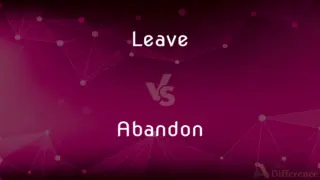Enslave vs. Subjugate — What's the Difference?
By Urooj Arif & Fiza Rafique — Updated on May 9, 2024
Enslave involves taking away freedom primarily to force labor, while subjugate means bringing under control, often through conquest.

Difference Between Enslave and Subjugate
Table of Contents
ADVERTISEMENT
Key Differences
Enslaving typically means forcing individuals into servitude, often through physical coercion or legal compulsion, focusing on labor and personal freedom. Subjugate, on the other hand, involves establishing control over a group or area, often after a conflict or through political power.
Enslavement directly affects personal liberty by imposing labor against one's will. Whereas subjugation may not always involve forced labor but can lead to a loss of autonomy or governance, affecting a broader socio-political context.
The process of enslavement is often perpetuated through legal or extralegal means targeted at specific individuals or groups. On the other hand, subjugation can occur on a larger scale such as the domination of entire populations or countries.
Historically, enslavement has been associated with the trade and ownership of humans as property. Conversely, subjugation has been more about the control and administration of territories and peoples, often after military conquest.
The term enslave is primarily used in contexts discussing forced labor and human rights abuses. On the other hand, subjugate is often used in historical and military contexts, describing the control over peoples or regions.
ADVERTISEMENT
Comparison Chart
Definition
To make someone a slave, forcing them to work without freedom.
To bring under domination or control, especially by conquest.
Focus
Individual freedom and labor.
Control over groups or territories.
Methods
Physical coercion, legal compulsion.
Military conquest, political control.
Common Contexts
Human rights discussions, historical accounts of slavery.
Historical military contexts, discussions of empire.
Impact on Individuals/Groups
Direct impact on personal freedom.
Broader impact on autonomy and governance.
Compare with Definitions
Enslave
To make someone a slave.
Pirates would capture travelers and enslave them.
Subjugate
To conquer and bring under control.
The empire subjugated numerous tribes.
Enslave
To cause to lose freedom.
The regime's policies effectively enslave its citizens.
Subjugate
To make submissive.
The dictator's tactics subjugated the dissenters.
Enslave
To control by influence.
Addiction can enslave a person's will.
Subjugate
To reduce the power of another.
The merger subjugated the smaller company's influence.
Enslave
To bind by compulsion.
Debt can enslave people to endless work.
Subjugate
To dominate or oppress.
The law was used to subjugate the minority groups.
Enslave
To hold in subjection.
The invaders enslaved the population.
Subjugate
To bring under domination.
The army subjugated the rebels swiftly.
Enslave
To make into or as if into a slave.
Subjugate
To bring under control, especially by military force; conquer.
Enslave
(transitive) To make subservient; to strip one of freedom; enthrall.
The migrants will be enslaved once they're no longer useful to the oligarchs; make no mistake about that.
Subjugate
To make subordinate or subject to the dominion of something else
"The urgency of the mating season is subjugated, for the moment, to the demands of self-preservation" (David M. Carroll).
Enslave
To reduce to slavery; to make a slave of; to subject to a dominant influence.
The conquer'd, also, and enslaved by war,Shall, with their freedom lost, all virtue lose.
Pleasure admitted in undue degreeEnslaves the will.
Subjugate
(transitive) To forcibly impose obedience or servitude upon.
Enslave
Make a slave of; bring into servitude
Subjugate
In a subjugated position.
Subjugate
To subdue, and bring under the yoke of power or dominion; to conquer by force, and compel to submit to the government or absolute control of another; to vanquish.
He subjugated a king, and called him his "vassal."
Subjugate
Put down by force or intimidation;
The government quashes any attempt of an uprising
China keeps down her dissidents very efficiently
The rich landowners subjugated the peasants working the land
Subjugate
Make subservient; force to submit or subdue
Common Curiosities
How does subjugation differ from enslavement?
Subjugation refers to the act of bringing under control or domination, often of larger groups, while enslavement refers specifically to making individuals slaves.
Can subjugation include enslavement?
Yes, subjugation can include enslavement as part of dominating a conquered people.
What is a historical example of subjugation?
The Roman Empire’s expansion involved the subjugation of various neighboring territories and peoples.
Can enslavement be temporary?
Historically and practically, enslavement is not typically temporary as it involves significant control over an individual's life.
Can individuals be subjugated?
Yes, individuals can be subjugated, often within larger groups, losing personal freedoms and autonomy.
What are typical scenarios where enslavement might occur?
Enslavement can occur in contexts of human trafficking, forced labor, and during historical times of slavery.
What does it mean to enslave someone?
Enslaving someone means forcing them into servitude, usually without pay and under harsh conditions.
Who are usually the agents of subjugation?
Typically, states, military groups, or political leaders act as agents of subjugation.
Is subjugate always physical in nature?
Not necessarily; subjugation can also be political or economic, where control or influence is exerted without physical force.
What laws govern against enslavement and subjugation today?
International laws, such as those from the United Nations, prohibit enslavement and practices of subjugation.
Share Your Discovery

Previous Comparison
Leave vs. Abandon
Next Comparison
Osteoporosis vs. OsteomyelitisAuthor Spotlight
Written by
Urooj ArifUrooj is a skilled content writer at Ask Difference, known for her exceptional ability to simplify complex topics into engaging and informative content. With a passion for research and a flair for clear, concise writing, she consistently delivers articles that resonate with our diverse audience.
Co-written by
Fiza RafiqueFiza Rafique is a skilled content writer at AskDifference.com, where she meticulously refines and enhances written pieces. Drawing from her vast editorial expertise, Fiza ensures clarity, accuracy, and precision in every article. Passionate about language, she continually seeks to elevate the quality of content for readers worldwide.












































